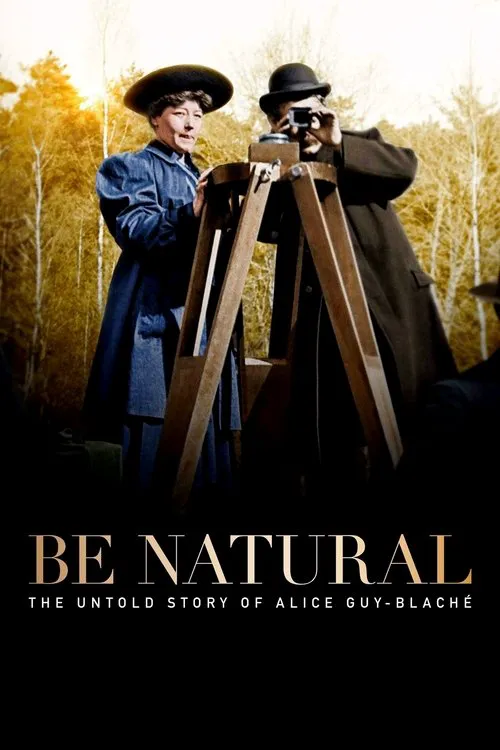Be Natural: The Untold Story of Alice Guy-Blaché

あらすじ
In the early days of cinema, a young woman named Alice Guy-Blaché stepped into a revolutionary world that was rapidly evolving. Born on July 1, 1873, in Lyon, France, Guy-Blaché's life took an extraordinary turn when she discovered her passion for filmmaking. At a time when women's roles in society were strictly defined, Guy-Blaché defied convention to pursue her dreams and, in the process, became a trailblazing figure in the history of cinema. In 1894, at the age of 21, Guy-Blaché began working in the burgeoning film industry, initially as an administrative assistant at the Gaumont filmmaking company based in Paris. Despite limited opportunities, Guy-Blaché seized every chance to learn about the technology, techniques, and innovations driving the burgeoning medium. It was during this time that she met Louis Le Prince, one of the pioneers of filmmaking, who inadvertently mentored her on the craft, though she may not have directly associated with him. In 1896, Guy-Blaché began making her own films with the Gaumont's Pathé Brothers. Under the tutelage of its founder Léon Gaumont, Guy-Blaché became the world's first female film director with the release of her film 'Le Coucher de la mariee' ('The Woman's Awakening'). The short film, showcasing a woman waking up from a dream, marked a pivotal moment in cinema history as a pioneering example of a narrative fiction film. Guy-Blaché continued to write and direct numerous films through Gaumont, rapidly becoming one of the prominent figures of the time. In her first two years as director, she made a total of 70 films, mostly in one-minute formats. Guy-Blaché not only mastered the technical skills of filmmaking but also demonstrated extraordinary versatility in the range of films she made, covering topics such as crime, drama, and comedy. In the early 1900s, Guy-Blaché ventured into film production at her own studio, which she initially established in France. Later relocating to the United States, she formed her own production company, Solax Studios, which continued to produce hundreds of successful films. Her work in the U.S. not only earned her widespread acclaim but also brought recognition to her work as a pioneering woman in a male-dominated medium. The American period of Guy-Blaché's life marked a significant shift in her filmmaking endeavors. Many of her silent films, created during her time at Solax Studios, tackled various social issues such as racial integration and workplace ethics. One of her notable films, 'La Question d'argent' (The Affair of the Heart), is often cited as one of the earliest examples of a social realist film. This marked a turning point in her career, moving her away from the earlier comedic and melodramatic style of movies that she initially focused on. However, as the 1920s approached, the cinema landscape began to change swiftly due to the advent of sound and the introduction of Hollywood film's dominance in the market, ultimately overshadowing independent filmmakers, including Guy-Blaché. The rise of big-budget studios and larger-than-life production companies pushed independent filmmakers like Guy-Blaché to the periphery. In the face of financial difficulties and diminishing opportunities, Guy-Blaché decided to retire from filmmaking in 1925. Guy-Blaché spent the next several decades of her life advocating for the recognition of her work. Despite her tireless efforts to revive her legacy, she faced a series of challenges, including being largely ignored by film historians and institutions. However, this did not deter her spirit. A decade before her passing, the film restoration and preservation movement revived a renewed enthusiasm for the silent era and Guy-Blaché's legacy, eventually paving the way for her to receive the accolades she deserved. In 1977, the American Film Archives discovered and restored many of Guy-Blaché's forgotten films, giving new life to a body of work that nearly vanished to the sands of time. Decades after her pioneering days, when film historians finally took notice of her monumental achievements, Alice Guy-Blaché went down in cinema history as a trailblazing filmmaker and a ground-breaking figure, paving the way for future generations of women in the industry. Guy-Blaché's passing on March 25, 1968, in New York left behind an enduring legacy as a true pioneer of cinema. Her determination to defy societal norms and pursue her passion in the early days of the film industry served as an inspiration to numerous aspiring filmmakers. The discovery and reappraisal of her pioneering work has secured a lasting place for her in the annals of film history, and her work continues to be celebrated as a true embodiment of the spirit of innovation that defined cinema's early years.
レビュー
おすすめ




